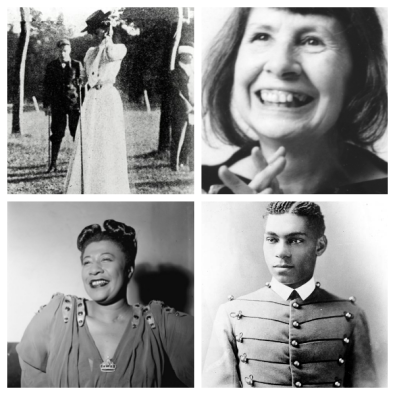 There was nothing extra special enough for a long post today, so here are a few smaller ones:
There was nothing extra special enough for a long post today, so here are a few smaller ones:
• On this day in 1878 was the birth of Margaret Abbott, the first woman to win first place in an Olympic event when she won the women’s golf tournament. The year she participated, 1900, was the first year that women were allowed to compete– but only in ‘ladylike’ sports such as tennis, yachting, and golf. The Olympics were so disorganized that year that many competitors didn’t even realize that their events were actually part of the Olympics; in fact, Margaret herself never knew she had won an Olympic event, as the tournament she played in wasn’t established as officially part of those Olympics until after her death.
• On this day in 1920, was the birth of Amy Clampitt, an American poet and author. She was born to Quaker parents, and studied at the American Academy of Arts, and Grinnell College. She was not published as a poet until 1978, when she was 58 years old. She went on to publish her first full-length collection, The Kingfisher in 1983 (aged 63), and would eventually publish several more books of poetry. Her last book, A Silence Opens, was published in 1994, the year she died. Just a year or so before she was diagnosed with cancer, however, Amy won the MacArthur Foundation’s “genius grant”, and used the money to buy a small clapboard house. Not wanting the house to be broken up upon her death, her husband promised it would always be theirs and that he’d keep it safe. After her death (and before his own in 2001) her husband came up with the idea for a fund to benefit poets and literary artists. Since 2003, that little house has been a part of that dream, offering “Clampitt Residencies”– helping new and rising poets by offering 6-12 month residencies in the house, where they can find inspiration among the books, trinkets, and other objects that inspired Amy herself. You can read some of Amy Clampitt’s poetry here.
• On this day in 1996 was the death of Ella Fitzgerald an African-American Jazz Singer popularly known as the “First Lady of Song” and the “Queen of Jazz”. Having started singing with an Orchestra known for performing especially in the Savoy Ballroom in Harlem, Ella eventually signed with Norman Granz, who created the label Verve Records based in part on Ella’s talent. It was here that she recorded most of her popular music, including her take on the Great American Songbook. Some of her most notable performances and songs were collaborations with artists like Duke Ellington, and Louis Armstrong. By the time of her death, she had won fourteen Grammy Awards, a National Medal of Arts, and a Presidential Medal of Freedom.
And finally, this last one isn’t about a woman but is still important from an intersectional/civil right’s perspective:
• On this day in 1877, Henry Ossian Flipper (who was born a slave in Georgia in 1856) became the first African-American cadet to graduate from the U.S. Military Academy at West Point. He was never spoken to by a white cadet during his entire four years at West Point, and after graduating, was appointed a second lieutenant in the 10th Cavalry (an all-African American cavalry), which was stationed at Fort Sill in Indian Territory. He was the first non-white officer to lead the soldiers of that cavalry, and though he served with distinction and was more than competent, he could never escape the same discrimination he faced during his four years at West Point. He was followed by rumors alleging improprieties, and eventually was court martial-ed and dismissed from the U.S. Army. In 1994 his descendants petitioned the U.S. Military to review his dismissal. The review found that his conviction and punishment had been “unduly harsh and unjust” and changed his dismissal to a “good conduct discharge”. His family then filed an application for pardon with the Army, and on February 19, 1999 President Clinton pardoned him. The first African-American cadet to actually be admitted to West Point was James Webster Smith in 1870, but he never made it to graduation. Female cadets were not admitted into West Point until 1976.
You must be logged in to post a comment.